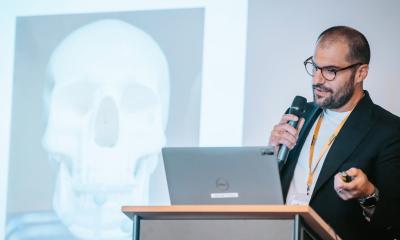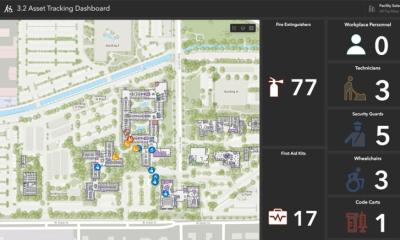Photo: Mark Nicholls
Article • Personalizing stroke care
Advancing genomic medicine from promise to practice with digital technology
Stroke patients in four NHS hospitals are now receiving genetic tests that determine whether a commonly prescribed drug will work for them – a breakthrough that could transform treatment for millions. Digital approaches are spearheading a drive to help make genomic medicine part of everyday care. The role of digital tools was a central theme at the HETT (Healthcare Excellence Through Technology) North conference in Manchester.
By Mark Nicholls
The use of digital technologies to study and analyse genetic information is offering a greater understanding of biology and genes, with those advances being transformed into action to make a direct difference to patient care.
In a major step forward for stroke care, genomic medicine is being piloted in the NHS in four hospitals in the UK to indicate which patients will respond best to a commonly used drug and identify those that may need to be guided down a different treatment pathway.
Frontline implementation
Chairing the session, Dr Videha Sharma, Clinical Innovation Lead and Lecturer in Health Informatics at the University of Manchester, pointed to how digital technology and data management are evolving towards making genomic medicine part of routine care. ‘It is helping us to move from understanding biology and data in our genes to turn them into action so that we can start to see the potential of personalized care for patients,’ he explained.
The session explored key considerations for integrating digital tools effectively into clinical practice and how digital genomics can enhance care and the patient experience. This was vividly illustrated by Dr Ahmad Maatouk, the clinical lead for stroke services and the Genetic project lead at Doncaster and Bassetlaw Teaching Hospitals (DBTH) in Yorkshire, England, who outlined a real-life frontline implementation of genomics-informed medicine for stroke patients.
The pilot project follows publication of the UK health regulator NICE’s guidelines on CYP2C19, a gene that encodes an enzyme that metabolizes commonly prescribed drugs such as clopidogrel and anti-depressants.
Personalized treatment
Maatouk’s team at the DBTH focused on CYP2C19 testing in patients who had suffered stroke or transient ischemic attack (TIA) to assess them for the suitability to clopidogrel and their response. He explained the importance of this step as some 30% of white British people have a mutation that does not metabolise the drug. That rises to 40% for patients of Middle Eastern and Mediterranean origin and up to 60% in Asian people, meaning there is a significant portion of the population where the drug can be less effective.
He said that patients taking part in the pilot can be tested for their suitability to clopidogrel with results returned within a week, with treatment adjusted according to the findings. It is part of a seven-month pilot led by the NHS England (NHSE) stroke programme to implement genetic testing of the CYP2C19 variation to offer personalized treatment and make it part of standard stroke care this year.
Representative data
We found something that we had been sitting on for a while just because we did not have that power of data. This is where we can get to if we pool NHS genomic data together
Demetra Georgiou
Panellists said a critical step was ensuring that the data gathered was representative of society. Demetra Georgiou, who is Genetics Transformation Manager at Imperial College Healthcare NHS Trust, also underlined the need for data that is structured and accessible in one place. This is particularly relevant in rare disease, where only a handful of people have a certain condition, in order to facilitate treatment and assess clinical trial eligibility.
She said the NHS is working towards central digital streams, and pointed to an example where it was discovered that children with undiagnosed neurodevelopmental conditions had the same variant across their genomes. ‘We found something that we had been sitting on for a while just because we did not have that power of data. This is where we can get to if we pool NHS genomic data together,’ added Georgiou.
Continuous engagement
Ali Connell is Director of Digital Health at Our Future Health UK, the UK’s largest research study that joins personal and health-related data to genetic data. He underlined the importance of collecting representative data and that there is a ‘robust and sensible measurement plan to understand impact’ combined with realistic roll-out of information streams to patients. That will gauge relevance on genetic tests and help the NHS understand ‘how best to care for population as a whole, not just people taking part in the research.’ He added that maintaining public input is important, and particularly the need for continuous engagement.
Data protection
The panel discussed concerns over genomic data, such as privacy, data protection and regulation. Georgiou said: ‘It is a fine balance between being reserved and careful without running the risk of missing out on having a very impactful solution that could help the NHS.’
Patient Advocate and Rare Disease Male Mental Health Coordinator, David Ross said the stroke trial seemed hopeful and was inclusive but stressed that patients need to be given the right information at the right level. The panel also highlighted how AI and digital solutions have real potential but have to be seen within the lens of healthcare, that is ‘safe, applicable and relevant.’
Profiles:
Videha Sharma is an NHS Clinician and Clinical Innovation Lead and Lecturer in Health Informatics at the University of Manchester. Besides his medical practice, Videha leads and coordinate digital health projects with specific expertise in interoperability, user-centred design and digital transformation.
Dr Ahmad Maatouk is a Stroke & Acute Medicine Consultant and Clinical Lead for Stroke Services at Doncaster and Bassetlaw Teaching Hospitals (DBTH). He leads the digital transformation of stroke genetic testing and serves as the Point of Care Ultrasound Lead at DBTH.
Demetra Georgiou is Genetics Transformation Manager at Imperial College Healthcare NHS Trust and is Chair of the British Society for Genetic Medicine. She has a decade of experience as a Genetic Counsellor within the NHS and has subspecialised in cancer genetics and contributed to research, national guidelines, and policy.
Ali Connell is Director of Digital Health at Our Future Health UK, the UK’s largest research study, and also sits on the Royal Society of Medicine’s Digital Health Council.
David Ross is a Patient Advocate with a rare condition and set up a rare disease men’s mental health group with the purpose of giving men a chance to share their experiences and listen to others going through similar experiences.
07.10.2025





